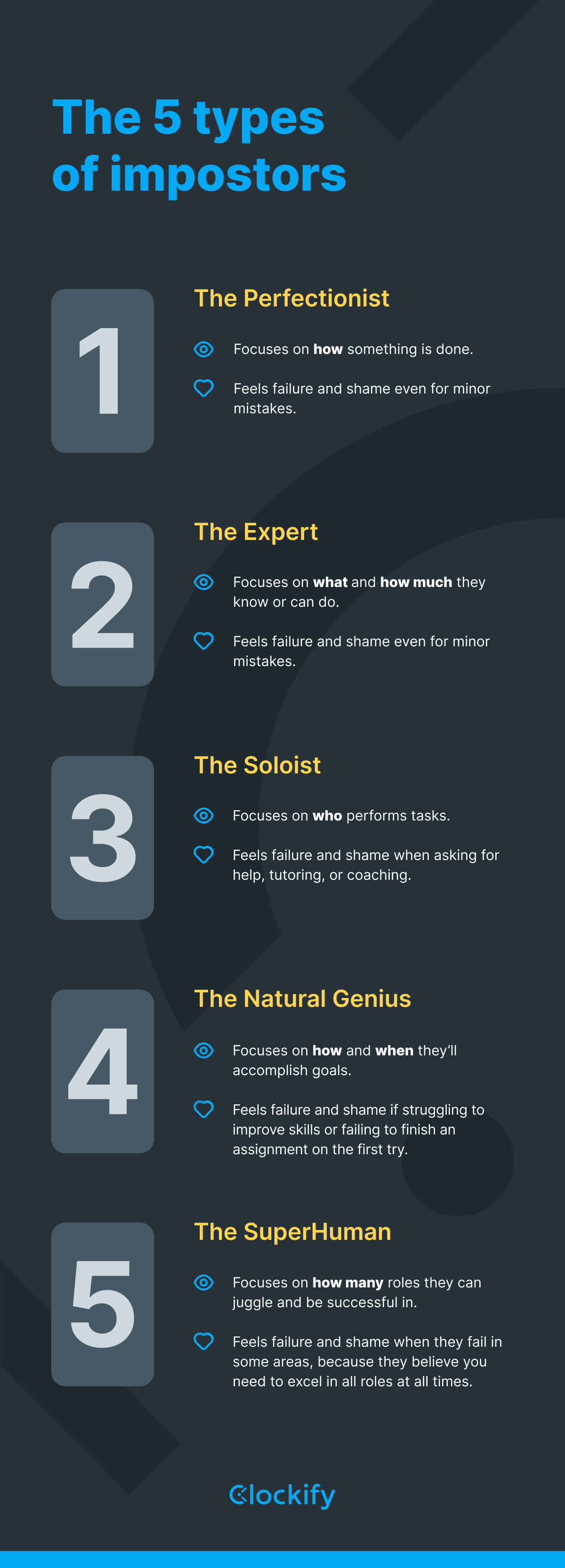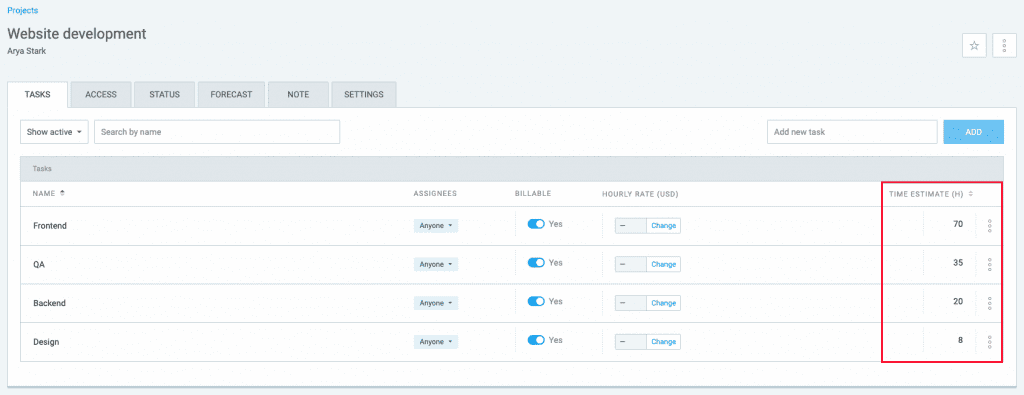What do Natalie Portman, David Bowie, and Michelle Obama have in common?
At some point in their lives, they all struggled with that nagging belief that they’re frauds whose success is a result of luck, not their talents.
In other words, they’ve all experienced imposter syndrome.
So, how can we overcome this terrible feeling and build self-confidence at work?
That’s exactly what we’re trying to figure out in this blog post. So, if you have ever experienced such a feeling or know someone who has, stick around for some expert tips on how to get rid of imposter syndrome at work.
In this blog post, we’ll cover:
- The meaning of imposter syndrome,
- The 4 pillars and signs of the imposter phenomenon,
- Causes and types of imposter syndrome, and
- 8 Expert tips to overcome imposter syndrome.
What is imposter syndrome?
Imposter syndrome is the feeling of self-doubt that individuals experience about their work accomplishments. They believe they don’t deserve their jobs or success or that they can never meet others’ expectations.
As a result, they feel like imposters or frauds at the workplace.
Also known as imposter phenomenon or imposter experience, imposter syndrome at work is quite common. In fact, a systematic review discovered that while the numbers vary, imposter syndrome affects as many as 82% of people.
Despite the term “syndrome”, imposter syndrome is not a diagnosable disorder of any kind, according to Carolyn Herfurth. Carolyn is a co-founder of Impostor Syndrome Institute, who we had the chance to speak to about the subject.
Here’s how Carolyn defines imposter syndrome:

“It’s this belief that millions of people worldwide share — that they are not as talented, intelligent, capable, or qualified as others think they are. And, the fascinating thing about it, is that these feelings exist despite all the evidence of our accomplishments — diplomas, awards, business growth, promotion.”
Is imposter syndrome real or fake?
While the term was first described in the late 70s by researchers Pauline Clance and Suzanne Imes, many studies conducted since then point to the fact that imposter syndrome is real.
According to the American Psychological Association, psychologists view imposter syndrome as a “very real and specific form of intellectual self-doubt.”
However, not everyone agrees with this view. For instance, authors Ruchika Tulshyan and Jodi-Ann Burey argue that the loss of self-confidence that women experience is not because of imposter syndrome but because of exclusion and bias they face at work.
Even though the authors focus on women in their study, it’s important to note that both men and women experience imposter syndrome at work.
While the debate on whether imposter syndrome is real or not continues, knowing the indicators and signs is the first step to overcoming these negative feelings.
What are the 4 P’s of imposter syndrome?
The 4 pillars of imposter syndrome refer to the 4 traits that are typical for imposter syndrome. As described by Clare Josa, keynote speaker, author of several books, and a global authority on imposter syndrome, these are the four traits:
- Perfectionism: setting exceptionally high standards and dismissing achievements as luck or a fluke,
- Procrastination: dancing around tasks instead of directly tackling them,
- Project paralysis: hiding from tasks, much like a rabbit in headlights, until the deadline compels them to take action, and
- People pleasing: seeking approval of others to feel a sense of belonging and to avoid rejection.
Struggling to identify these traits within yourself? The following section outlines easily recognizable signs of imposter syndrome.
How do I know I have imposter syndrome?
Here are 10 questions that can help you know if you have imposter syndrome:
- Do you often tend to overwork (staying late or going to work early) just to prove to yourself that you’re enough?
- Do you blame and criticize yourself for minor mistakes?
- Do you feel like a fraud who’s fooling your coworkers and boss, and fear you’ll be exposed?
- Do you believe that your colleagues are organized and have everything under control, unlike you?
- Do you attribute your success to luck?
- Do you feel that you can’t accept praise because you feel that your work is not good enough, even though others say it is?
- Do you think that your job defines you?
- Do you feel uneasy asking for help?
- Do you find that you can’t seem to start or finish your projects?
- Are you rejecting new opportunities or avoiding challenges at work?
If you answered ‘yes’ to all or some of these questions, you probably have imposter syndrome at work.
Still not sure if you suffer from the imposter phenomenon? Dr. Pauline Rose Clance created a test that can help you find out.
What does imposter syndrome feel like?
While no individuals with imposter syndrome may feel the same way, the most common feelings can include:
- Discomfort,
- Fear of failure, and
- Guilt.
It can feel like a toxic voice in your head, constantly telling you, “you’re a fraud,” or “you don’t deserve the praise.”
Even when people with imposter syndrome succeed at work, they feel like they faked their way to it and fear that it’s just a matter of time before others at work realize it. This is also true of celebrities.
For instance, Emma Watson said in a Vanity Fair interview: “I’m so wrong for this job because I’m too serious; I’m a pain in the ass; I’m difficult; I don’t fit.”
People with imposter syndrome often experience deep self-hatred, anxiety, and loss of self-confidence, according to Christina Helena, a TEDx speaker and public speaking coach.
When people treat these negative narratives as a fact, it can prevent them from taking up new challenges, moving forward, or living a life aligned with their values.
This brings us to the next question: what causes imposter syndrome?
What causes imposter syndrome?
We asked Carolyn Herfurth, who works on educating executives and employees worldwide on imposter syndrome, to tell us more about the main triggers for the imposter syndrome at work.
Carolyn bases her answers on the book by Valerie Young, another co-founder of the Imposter Syndrome Institute, The Secret Thoughts of Successful Women.
Cause #1: Family messages and expectations
Carolyn points out that one of the causes of the imposter syndrome are family messages and expectations — i.e. how different families have different expectations from their children.

“Let’s say that you’re the kid who comes home with 4 As and one B on your report card. And your family’s response is: ‘What is that B doing there?’ So, that might create the message that everything you do has to be perfect. And all the kid really wants is praise — because, for kids, praise is like oxygen.”
On the other hand, Carolyn adds, other families may have different reactions.

“In another family, when you come home with straight As, your family may not even acknowledge that. It might be so because, for this family, success is defined as you growing up to be part of a family business. Or, just getting married and popping up grandkids. Or going into the military. It’s always a little different.”
Cause #2: Confidence gaps between genders
Another cause is the confidence gap between genders — people who identify as men and people who identify as women (while sex refers to our biological differences, gender involves a broad spectrum — “how a person identifies”). According to Carolyn, the lack of confidence tends to affect younger women.

“When they’re in their 20s or 30s, women don’t have as much confidence as men. They get a little more confident in their 40s and 50s, and by their 60s, women are like: ‘We’re more confident than men.’ ”
Cause #3: A lack of inclusivity
Is your culture inclusive? That’s another aspect to consider when talking about the main causes of the imposter experience.
As Carolyn puts it, cultural identity (or lack of it) can influence one’s sense of belonging at the workplace.

“If you walk into a room and nobody else looks like you or sounds like you, you’re not going to feel the same sense of belonging as you might when you walk into a room where everybody does look and sound like you.”
Carolyn highlights that diversity also refers to different age groups.

“Valerie did a talk on Facebook. When she asked people: ‘Have you ever felt underestimated because you were the youngest person in the room or the oldest person in the room’, the thirty-year-olds raised their hands about feeling underestimated, as the oldest people in the room. So, it’s all relative.”
💡 Clockify Pro Tip
Want to learn the secrets of building a cohesive team? Check out this blog post for tips and insights on team management:
Cause #4: Increased work pressure in specific industries
While imposter syndrome is common across industries, people working in specific industries, like STEM (Science, Technology, Engineering, and Mathematics), are more likely to experience the phenomenon.
Carolyn elaborates that the pressure of having to keep up with technology developments in the field can trigger feelings of inadequacy or a lack of belonging.

“People in tech often feel like they have to keep up with all the latest technology developments — and that’s impossible. People in fields like STEM might have a sense of that.”
The 5 types of impostor syndrome
According to Valerie Young’s research, there are 5 types of imposter syndrome:
- The Perfectionist,
- The Expert,
- The Soloist,
- The Natural Genius, and
- The Superhuman.

Imposter type #1: The Perfectionist
This type of imposter focuses on how something is done.
Even a minor mistake — no matter the fact that the rest of the performance is impeccable — can make this imposter feel failure and shame.
Many of us have come across Perfectionists, such as Aasha Foster, a PhD student at Columbia University. She shared her story in the American Psychological Association article we previously mentioned:
“I have certainly been accused of being a perfectionist and obsessing over details until I get nudged to finally let it go.”
Despite “bending over backwards” to ensure perfection, Aasha says she is never sure of the outcome.
Imposter type #2: The Expert
Unlike the Perfectionist, the Expert aims attention to what and how much they know or can do.
Since Experts believe that they should know everything, when mistakes occur, even minor ones, they experience shame and failure. Despite working for years in their field and acquiring specialized skills, Experts feel they are incapable of handling their job.
Let’s see what the Expert feels like with this example.
The executive director of a donor group that prioritizes animal welfare, Mikaela Saccoccio, avoided speaking at events and writing blogs on her company’s philanthropic work. She did so because she felt she would be “taking space away” from more experienced and knowledgeable animal advocates.
Imposter type #3: The Soloist
The primary concern for Soloists is who performs tasks.
They think that they should do everything on their own.
As an example, Valerie Young talks about the traits of a Soloist using Diane, a new project manager, in her book. As the first woman in her company to take on this role, Diane felt the pressure of being in a job mostly held by men.
When faced with a tough project, Diane didn’t seek help, fearing it would make her seem incapable. This led her to overwork, leaving early in the morning and returning late at night. This harmed the project and, more importantly, her health, ultimately leading to her taking medical leave.
Like Diane, Soloists believe that asking for help, tutoring, or coaching, clearly indicates failure that causes shame.
💡Clockify Pro Tip
Prioritize mental health at the workplace with our detailed guide. Explore your options, learn how to recognize the need and ask for this crucial break.
Imposter type #4: The Natural Genius
For the Natural Genius, it’s important to know how and when they’ll accomplish their goals. This type of imposter believes that finishing a task quickly is a sign of one’s competence.
So, struggling to improve skills or failing to finish an assignment on the first try means failure for them, which further causes shame.
Let’s explain this with an example. John did well in his previous role in his company and got promoted to a managerial position. But, when he attends the team meeting, he realizes that he has to learn complex skills to succeed at his new role.
As learning the new skills took considerable time, John feels ashamed that he is not naturally adept in his new managerial role and that he is incompetent.
Imposter type #5: The Superhuman
Superhumans focus on how many roles they can juggle and be successful in.
These roles usually include being:
- A partner,
- A parent,
- A friend,
- An employee,
- A volunteer, etc.
For instance, a Superhuman who is a brilliant project manager wants to excel at writing, public speaking, and marketing as well. Or, take the case of Lotta Sampson-Stone, a single mother and a student who feels the pressure of being perfect at everything.
“I am quite critical of myself as a single parent. I am conscious of trying to portray myself online and to my family as the perfect mother and now at university, I also want to be a perfect student. It can be hard to juggle everything.”
When Superhumans fail in some areas, they feel ashamed — because they believe they need to excel in all roles at all times.
Try Clockify by CAKE.com today
8 expert tips for overcoming imposter syndrome at work
Now that we’ve seen that many employees feel like frauds at some point in their lives, the obvious question is — how to fight imposter syndrome at work?
Luckily, in the following lines, we gathered some invaluable tips from experts on how to get over imposter syndrome at work.
Expert tip #1: Recognize your emotions and make a list of accomplishments
To find the most effective way to deal with imposter syndrome at work, we reached out to Amy Clark, the Founder and Executive Coach at Growth Minded Leadership Group.
In her opinion, the first step to overcoming imposter syndrome at work is recognizing emotions and fears — and then naming them.

“By doing this, you are redirecting your brain to facts and reclaiming your power over these emotions and fears. Building your understanding of emotions helps you become wiser in your response to them.”
Next, Amy recommends making a list of accomplishments — the list that contains details about what you specifically did to get where you are today.
As she points out, this is a great reminder that you created the successful position you are in today and can continue to achieve success in the future.
💡 Clockify Pro Tip
Want to know how to better manage your emotions at work and achieve psychological well-being? Check out this guide:
Expert tip #2: Try positive reframing and cognitive restructuring
Another expert we reached out to is Claire Randall, the Human Resources Director at Heat Pump Source.
Much like Amy, Claire also believes that it’s important to be aware of the symptoms of imposter syndrome — so that you can identify when you’re feeling them.
Claire elaborates that these symptoms of imposter syndrome can be:
- Perfectionism,
- Constant self-doubt, and
- Fear of failure.
Once you’re aware of the symptoms, these are the techniques Claire recommends for dealing with imposter syndrome:

“One is called ‘positive reframing.’ This means looking at your past successes and reminding yourself that you’ve accomplished things before, so you can do it again. Another technique is called ‘cognitive restructuring.’ This means identifying your negative thoughts and challenging them with evidence to the contrary.”
Expert tip #3: Try not to compare yourself to others
Amy Clark shared another valuable tip with us.
She says that comparing yourself to others is not a healthy way to grow — so you should stop doing it.

“Instead of comparing yourself to others, lead with a growth mindset. Identify where you believe you can be better. Replace: ‘I’m not as good as…’, with ‘What do I need to learn to do this well?’ ”
Organizational psychologist, executive coach, and author of Leading Inclusion, Dr. Gena Cox, agrees with this belief. She further explains that, when you compare yourself to someone, you give your power away.
To help overcome this tendency, Gena claims that we need to remind ourselves that each human is unique and has their own strengths and weaknesses.
Instead of comparing ourselves to others, she suggests setting a goal and creating a plan to achieve it.

“It is better to:
1. Set your own vision for what you desire — and create a plan to achieve it,
2. Keep your vision to yourself — but work towards it every day,
3. Celebrate your small wins, and
4. Step out and share your progress when you have something to share and want others to see your progress.
Then, repeat this all over again for your next goal.”
Expert tip #4: Talk to someone about your problem
Claire Randall believes that it can also be helpful to talk to someone you trust about your imposter syndrome.

“This can help you get some outside perspective and realize that other people feel the same way sometimes. Finally, remember that everyone makes mistakes — even successful people! It’s okay to mess up occasionally, and it doesn’t mean that you’re not good enough.”
Expert tip #5: Focus on how you’ll react to potential mistakes
In line with our previous tip, when mistakes happen, you should focus on how you’ll react to them.
One thing is for sure — you can’t travel to the past and prevent yourself from making mistakes.
But, what you can do is reflect on it and take effective steps to make things right:
- Analyze what went wrong,
- Find the way to fix this problem, and
- Think about how to prevent the same mistakes in the future.
Expert tip #6: Find a mentor
Once again, you shouldn’t have to deal with imposter syndrome all by yourself. Instead, you can find a mentor — such as your colleague or someone in your field of expertise.
This way, whenever you’re doubting yourself, you’ll be able to hear the other side — and see whether your doubts are justified.
Expert tip #7: Predict imposter syndrome
If you’ve noticed that particular situations or events make you more likely to experience imposter syndrome, use that information to your advantage.
Be mentally prepared for such situations, so that you can deal with the imposter experience more effectively.
For example, you may find filling out self-assessment reviews stressful because this makes you feel like an imposter. So, how to prepare yourself better?
You can keep a list of your accomplishments throughout the year. Whenever you finish a project successfully or get positive feedback from your manager, be sure to write that down on your list.
This way, you’ll have proof that you’re doing your job right — and maybe you won’t feel like a fraud anymore.
💡 Clockify Pro Tip
Filling out performance reviews doesn’t have to be intimidating. If you need help with evaluating yourself and your performance, as well as analyzing the performance of your employees, check out the following articles:
Expert tip #8: Normalize imposter syndrome and reframe your experiences
According to Carolyn Herfurth, to overcome imposter syndrome, it’s vital to normalize it first.

“Just say: ‘Hey, a lot of people experience this, it’s ok’. Share what’s going on.”
The next step is, as Carolyn believes, reframing your experiences.

“When an imposter moment hits you probably think: ‘Oh, my god, I’m going to get fired because they’re going to find out I’m not as smart as they think’. That is a feeling. That is not based on facts. Separate those things and reframe them, by saying: ‘Ok, how do I look at this in a different way?’ ’
Furthermore, Carolyn recommends finding out where that feeling is stemming from and looking at the facts of the situation.

“Our feelings can create a lot of stories and drama that don’t need to be there. And that’s why we need to look at the facts. An example might be asking ourselves: ‘What happens if they find out I really don’t know what I’m doing and I get fired?’ Well, what happens if you actually do know what you’re doing and you don’t get fired?”
Carolyn also emphasizes the importance of understanding what imposter syndrome is. The more people know about it, the more likely they are to identify with it. And, it all comes down to how you frame the situation you’re in.

“Let’s say you’re in a meeting and they’re asking you these questions that you’re not sure you know the answers to. You can walk out of that meeting and say: ‘I really blew it in the meeting. I’m really in trouble.’ Or you can say: ‘Boy, did I have an imposter moment in the meeting today!’”
Carolyn concludes that we shouldn’t diminish someone’s feelings and experiences when they’re going through an imposter moment.
What can leaders do to support their employees in combating imposter syndrome?
Now that you’ve seen how you can help yourself fight the imposter phenomenon, let’s take a look at what managers can do to show support for their workers experiencing this syndrome.
Tip #1: Educate yourself and your team
Carolyn Herfurth encourages managers to be proactive and educate their teams about imposter syndrome.

“First and foremost, you can normalize the conversation by letting everyone know what imposter syndrome is and isn’t and what to do about it.”
Now, what happens when managers have no clue that their employees are experiencing imposter syndrome?
To be able to recognize that employees are experiencing imposter syndrome, managers need training and professional guidance too. Being familiar with the signs of imposter syndrome, such as always working long hours or avoiding challenges, can help. In addition, managers can check-in with their team regularly to understand the latter’s concerns.
Tip #2: Create a mistake-tolerant environment
According to Claire Randall, managers need to try to create an environment that allows occasional mistakes.

“Try to create an environment where mistakes are okay. This will help employees feel more comfortable taking risks and trying new things.”
Tip#3: Provide regular feedback
Claire believes that another way managers can help employees experiencing imposter syndrome is to give them regular feedback — both positive and constructive.

“Feedback — this will help them see that you value their work and that you’re willing to help them improve.”
Tip #4: Believe in your employees
Amy Clark points out that team leads should let employees know that they have confidence in them.

“Showing your employees examples of when they have been successful will reinforce strengths and show employees that they are valued members of the team. Finally, placing them in situations where they shine will generate a feeling of accomplishment and excitement about their contributions.“
Amy elaborates that by offering employees the space to practice materials ahead of time, managers can help them overcome any feelings of doubt and build confidence.
Tip #5: Promote transparency within the team
Dr. Gena Cox emphasizes that managers should not and cannot do anything about a team member’s internal feelings.
However, here’s what Gena recommends team leaders do — treat all team members the same way:

“Managers must make sure that they do not create inequities by choosing favorites and make pay, promotion, and other decisions fairly. Everyone who is a logical candidate gets a chance to be considered for opportunities.”
Gena also suggests that team leaders should allocate their resources and time equitably while providing stretch assignments and coaching. This helps build team members’ confidence to tackle new opportunities.
Tip #6: Encourage open communication
When experiencing imposter syndrome, some people may find it difficult to speak freely during team meetings, out of fear of coming across as incompetent at their job.
To let their employees speak up, and thus, fight the imposter phenomenon, managers should focus on improving team collaboration and communication.
Here are some ways to do so:
- Make sure nobody interrupts their coworkers while speaking,
- Give all team members equal time to share their thoughts during meetings, and
- Create an environment where team members can discuss mistakes, find ways to fix them, and celebrate examples of good work.
This way, employees will not only feel more comfortable expressing their thoughts and ideas, but also more valued.
💡Clockify Pro Tip
If you need help with staying focused at work, check out the following article:
How common is imposter syndrome in the workplace?
Studies by Gail Matthews, KPMG, and Kajabi, presented on the Imposter Syndrome Institute website, show that:
- 70% of successful people said they felt like imposters at some point in their lives,
- 75% of executive women claim that they’ve struggled with the imposter phenomenon, and
- 84% of entrepreneurs and small business owners say that they’ve felt like imposters at some point in their lives.
In the 2021 State of the Workplace Report, which gathered 802 respondents, we can see that 96% of people were dealing with imposter syndrome at work.
How common is imposter syndrome across genders?
Now, what about genders?
Do women experience imposter syndrome more than men?
In a study conducted by Walr, 56% of the survey participants said “men and women are suffering equally from imposter syndrome”.
So, according to this study, there’s almost no difference between genders when it comes to imposter syndrome.
When I asked her about how different genders experience imposter syndrome, Carolyn Herfurth confirmed that it’s just a myth that only women deal with the imposter phenomenon — men do experience it, too.
However, there are some differences.
She explains that while both men and women are expected to excel at work, women face the added pressure of having to excel as a parent or homemaker.

“These are current expectations — men are expected to perform their job. Women are also expected to perform and excel at work. But, they’re also expected to excel as a parent, as a spouse, at taking care of their home, and dealing with her parents — all while maintaining a rock-hard body. “
These added pressures, according to Carolyn, can make women more susceptible to imposter syndrome.

“In other words: we, women, have more areas of achievement in our lives to feel badly about. So, the bar is set higher for women than it is for men.”
Carolyn continues that, generally speaking, women care very deeply about the quality of their work. And, because of that, they might exhibit more perfectionist tendencies.
Use Clockify by CAKE.com and other powerful apps to battle imposter syndrome
A great way to fight imposter syndrome is to check in with your work results regularly.
With a piece of time tracking software, you and your team can:
- Get tangible proof of achievements,
- Boost confidence, and
- Foster a sense of accomplishment.
Enter time tracker Clockify.
With Clockify by CAKE.com, you can equip your team with detailed reports and show them that their work really matters.

To see a Detailed report, just click on Reports on the left-hand side of your Clockify account. You will get interesting information about:
- Types and descriptions of tasks,
- Amounts earned,
- Time spent on projects, and plenty more.
Another way to beat imposter syndrome is to encourage growth by comparing time estimates versus actuals.

To set a time estimate in Clockify, go to a project’s Settings tab and choose Time estimate. Next, you type in the estimate in hours. This will help your team members struggling with imposter syndrome to see whether they are reaching goals in line with what you expect of them.
If so, bad news for their imposter syndrome.
But you can further promote your team’s organizational skills if you integrate Clockify with other tools, say a project management app like Plaky by CAKE.com. This piece of software lets you:
- Organize projects and processes faster,
- Align teams spread out around the world, and
- Finish tasks and reach deadlines faster than ever before.

With Plaky, you can enhance your team’s organizational skills — this reduces overwhelm, which often fuels imposter syndrome. What’s more, adding an app for team collaboration, such as Pumble by CAKE.com, can help foster a safe and inclusive work environment, too. You can have all 3 apps at a very special bundle price and save 53% on subscriptions.
With detailed reporting, real-time productivity monitoring, and integration with other tools, you’ll be well on your way to beating imposter syndrome for good.



